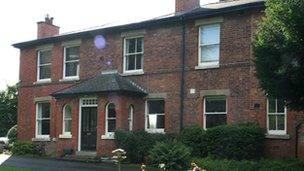Wilfred Owen: Call to protect WWI poet's home
- Published

Wilfred Owen was born at Plas Wilmot in 1893 but left the estate with his family four years later
Campaigners have called for the birthplace of World War I poet Wilfred Owen to be protected from large-scale development.
Owen, whose poems, including Dulce Et Decorum Est and Strange Meeting, came to define the horrors of trench warfare, was born at Plas Wilmot in Oswestry, Shropshire.
Saffron Rainey, chairman of Oswestry Civic Society, said: "He is a poet whose language, whether translated or in English, expresses war and how war was to develop through the 20th Century.
"It wasn't a noble activity. He expressed that, but also wrote about the humanity of it."
Apart from a plaque mounted on a secluded wall at the privately-owned house, nothing connects Owen with the house where he spent his earliest years.
The civic society said it was concerned the site had no protective status against development and feared the impact of "planning creep".
Listed status
What has given campaigners cause for greater urgency is an application to build seven houses in the orchard and other land within the remaining estate.
Outline planning permission has already been granted by Shropshire Council.
While further approval is required to agree the finer details, the decision means the "scale and nature" of the development has been backed by the local authority.
Mr Rainey said he was concerned the development could grow to nine or 12 properties.
The civic society has been critical of the timing of the council decision with an application to grant Plas Wilmot listed status currently being considered by English Heritage.
A spokesman for English Heritage said a report was being compiled for the Department for Culture Media and Sport and a final decision would ultimately be made by the secretary of state in the coming months.
According to Mr Rainey, the childhood homes of John Lennon and Paul McCartney offer a useful precedent for granting listed status on cultural grounds.
He said the civic society was not against all development on the site, but called for the key areas to be protected.
Local historian Nigel Tinsley is more critical of the local authority's decision.
He described plans to build on part of the land as "very seriously detracting from the heritage value of the site".
'Great freedom'
Councillor Karen Calder said the North Planning Committee had visited the site and was "satisfied that the [proposed] building would not detrimentally impact upon Plas Wilmot and that its formal gardens would be unaffected by the development".
She added that, while there was no official protective status in place, the house's "historical importance" was recognised.
Owen was just four years old when he moved with his family from a privileged life in Oswestry to a house in Birkenhead, before later moving to Shrewsbury.
Despite leaving Oswestry at such an early age Mr Rainey said he believed Plas Wilmot instilled a sense of "great freedom and security" in Owen and came to represent, for the whole family, a memory of a better time.
"Three of the houses they subsequently lived in they called either Wilmot or Plas Wilmot.
"The literary career of Wilfred Owen was very much influenced by his mother. His relationship with his mother was very important and Plas Wilmot was very important to her."
The poet died during action in the final days of WWI. His mother Susan received the news on 11 November 1918, while the bells of Shrewsbury rang out in celebration of the armistice.
- Published21 July 2012
- Published13 September 2011
- Published23 August 2011